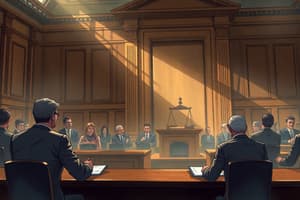Podcast
Questions and Answers
Who advocated for an applied psychological approach to practical life issues, including law?
Who advocated for an applied psychological approach to practical life issues, including law?
- Louis Brandeis
- Roscoe Pound
- Social Psychologists
- Hugo Munsterberg (correct)
During which century did legal scholars like Louis Brandeis and Roscoe Pound support the use of social science evidence in legal proceedings?
During which century did legal scholars like Louis Brandeis and Roscoe Pound support the use of social science evidence in legal proceedings?
- 21st century
- Late 20th century
- Mid 19th century
- Early 20th century (correct)
What is a key aspect of courtroom dynamics that social psychologists have contributed to?
What is a key aspect of courtroom dynamics that social psychologists have contributed to?
- Jury Instruction
- Change of Venue
- Extra-evidential Factors
- All of the above (correct)
What is an example of a realistic jurisprudence approach to law?
What is an example of a realistic jurisprudence approach to law?
What is a factor that social psychologists examine in the context of jury selection?
What is a factor that social psychologists examine in the context of jury selection?
What is an example of an extra-evidential factor that affects juror decision-making?
What is an example of an extra-evidential factor that affects juror decision-making?
What is the focus of the chapter's discussion of expert testimony?
What is the focus of the chapter's discussion of expert testimony?
What is the main contribution of social psychologists in the legal field?
What is the main contribution of social psychologists in the legal field?
What is a key issue discussed in the chapter regarding jury size and composition?
What is a key issue discussed in the chapter regarding jury size and composition?
What is the chapter's main focus regarding the integration of psychology and law?
What is the chapter's main focus regarding the integration of psychology and law?
Flashcards are hidden until you start studying
Study Notes
Jury Size and Selection
- Historically, juries composed of 12 individuals, but research indicates 6-member juries can provide unbiased decisions
- US courts allow 6-member juries for civil cases and all criminal trials except capital trials
- Challenges in jury selection include ensuring a representative cross-section of the community and identifying potential biases
Psychological Aspects of Jury Decision Making
- Research on jury size (6 vs 12) indicates 12-member juries are less likely to provide biased decisions
- Consensus bias and social pressure can influence jury decisions
- Psychological factors influencing jury decisions include race, culture, gender, socioeconomic status, political beliefs, social media, attitudes, and cognitive factors
Jury Selection Process
- Venire process involves identifying potential jurors, notification, and creation of a jury pool
- Challenges for cause and peremptory challenges are used to remove biased jurors
- The Victorian model assumes potential jurors can identify their biases, while the US model assumes they cannot
Legal Process and Jury Decision Making
- The legal process involves witnesses, testimony, exhibits, opening/closing statements, and judicial instructions
- Social cognition models apply to jury decision making, including input biases, processing biases, and output biases
- Jury decision making areas include attributions of causality, actor/observer bias, and the fundamental attribution error
Attorney Tactics and Expert Evidence
- Attorneys use tactics like vivid language, repetition, loaded questions, and definitional tactics to influence jurors
- Expert evidence involves qualification of witnesses, admissibility of evidence, and scientific acceptance of information presented
- Legal standards for expert evidence include the three-part test: subject matter, witness qualification, and scientific acceptance
Insanity and Sentencing
- Legal standard for insanity involves a defect of reason from a disease of the mind, lack of knowledge of the nature and quality of the act, and an inquiry to determine whether the defendant knew what they were doing was wrong
- Modern legal versions of insanity include the defendant lacking substantial capacity to know what they are doing is wrong
- Focal concern theory of sentencing involves considering defendant culpability, protection of the community, and practical constraints and consequences of the sentence
Studying That Suits You
Use AI to generate personalized quizzes and flashcards to suit your learning preferences.




